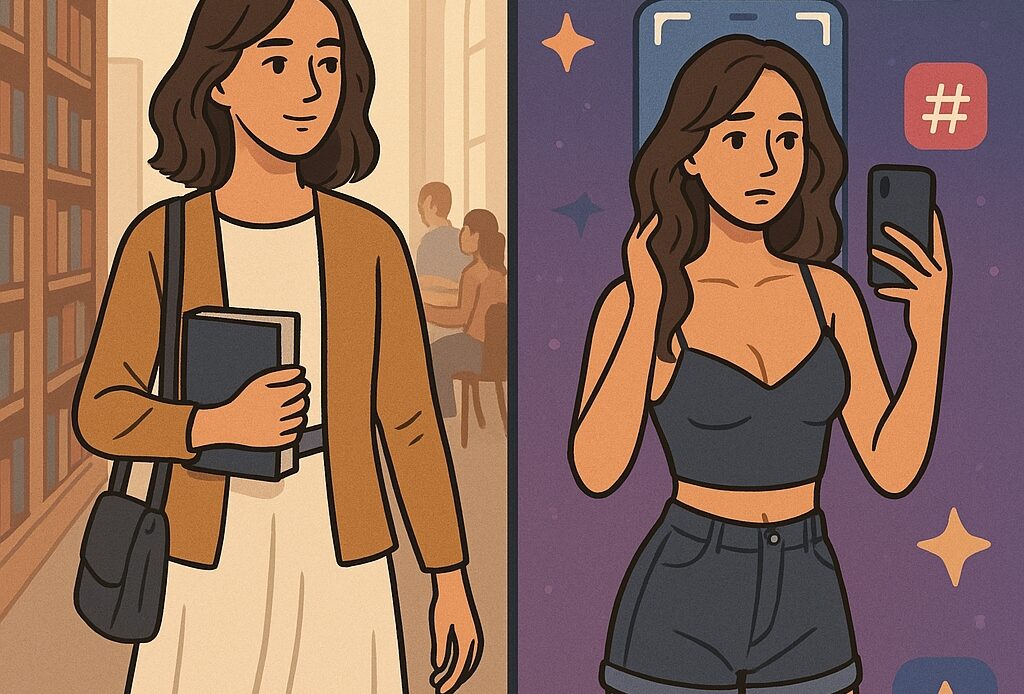
In today’s culture, we often point fingers at young women for what we label as “indecent dressing” or “immorality.” Social media platforms like Instagram, TikTok, and Snapchat have become digital billboards of curated beauty, sensuality, and influence. We shout about the moral decay, bemoan rising indecency, and complain that young ladies are no longer “modest.” But here’s the real question: Who is buying what they’re selling?
The Hypocrisy of the Gaze
Let’s get real. Much of what we criticise, we also consume. Our society creates demand for the very things we claim to detest. Nudity gets likes. Indecency gets shares. Provocative videos go viral faster than anything wholesome. This is simple economics: demand increases supply. If we didn’t give attention, the trend would fade.
We cannot scream about a problem we continue to fuel with our double standards. If the internet is a marketplace of influence, then we—yes, you and I—are often the customers. Our views, comments, likes, DMs, and “harmless” reposts all become currency in the economy of soft power.
What Is Soft Power, Really?
Soft power is the ability to influence others, not by force or command, but by attraction, appeal, and persuasion. Coined by political scientist Joseph Nye, it originally referred to nations influencing others through culture, values, and diplomacy. But in the 21st century, soft power is no longer just political—it’s personal.
Today, a young woman can post a video of herself dancing, and within minutes, gain thousands of views. Not because she’s solving world hunger or preaching peace, but because she embodies the kind of allure society rewards. Her power is in her presence, and she knows it. That’s soft power.
The Culture We Created
We have to ask: Why is it that the most revealing images go viral faster than the most inspiring ideas? Why does a lady in a bikini gain more followers than a girl leading a tech initiative or humanitarian project?
It’s not just about the women. It’s about us—the viewers, the followers, the audience. We’re the ones who made the algorithm this way. The social media platforms are not biased; they’re simply machines reflecting our collective desires.
If society gives power to nudity, then it’s no surprise when nudity becomes currency.
Young Women and the Search for Influence
For many young ladies, especially in an economy where job opportunities are shrinking and validation is scarce, social media becomes a way to feel seen, feel valued, feel powerful. And why not? If a dance video earns more attention than a degree, what message are we really sending?
Some young women may not even see themselves as selling sex. They are simply playing the game, using the tools available. If society tells you your body has value, you’d be foolish not to invest in that stock. We’ve left virtue unrewarded for so long that values have become invisible.
Can We Flip the Script?
We can’t just keep blaming women. That’s too easy. We must also blame the mirror—and the eyes looking into it. If we want to see a change, we must change what we reward.
Instead of shaming girls, we should rewire the culture. Follow more women who inspire rather than titillate. Engage content that uplifts, not undresses. Support creators who educate, motivate, and empower.
Men, especially, have a huge role to play here. We can’t demand modesty while promoting platforms that prioritise sensuality. We can’t condemn the culture and then turn around to binge it in private. That’s hypocrisy.
Conclusion: Soft Power Isn’t the Problem. Misused Power Is.
Soft power is not bad. In fact, it’s beautiful. Women have always possessed a unique kind of influence—one that is gentle, persuasive, emotional, and transformative. But when that power is reduced to just physical appeal, we all lose.
What if young women realised their bodies are temples, not tools for trade? What if society made virtue go viral? What if we stopped feeding the very fire we claim to fear?
Let’s stop being fake firefighters while carrying cans of petrol.
You want to change the culture? Change what you consume.
